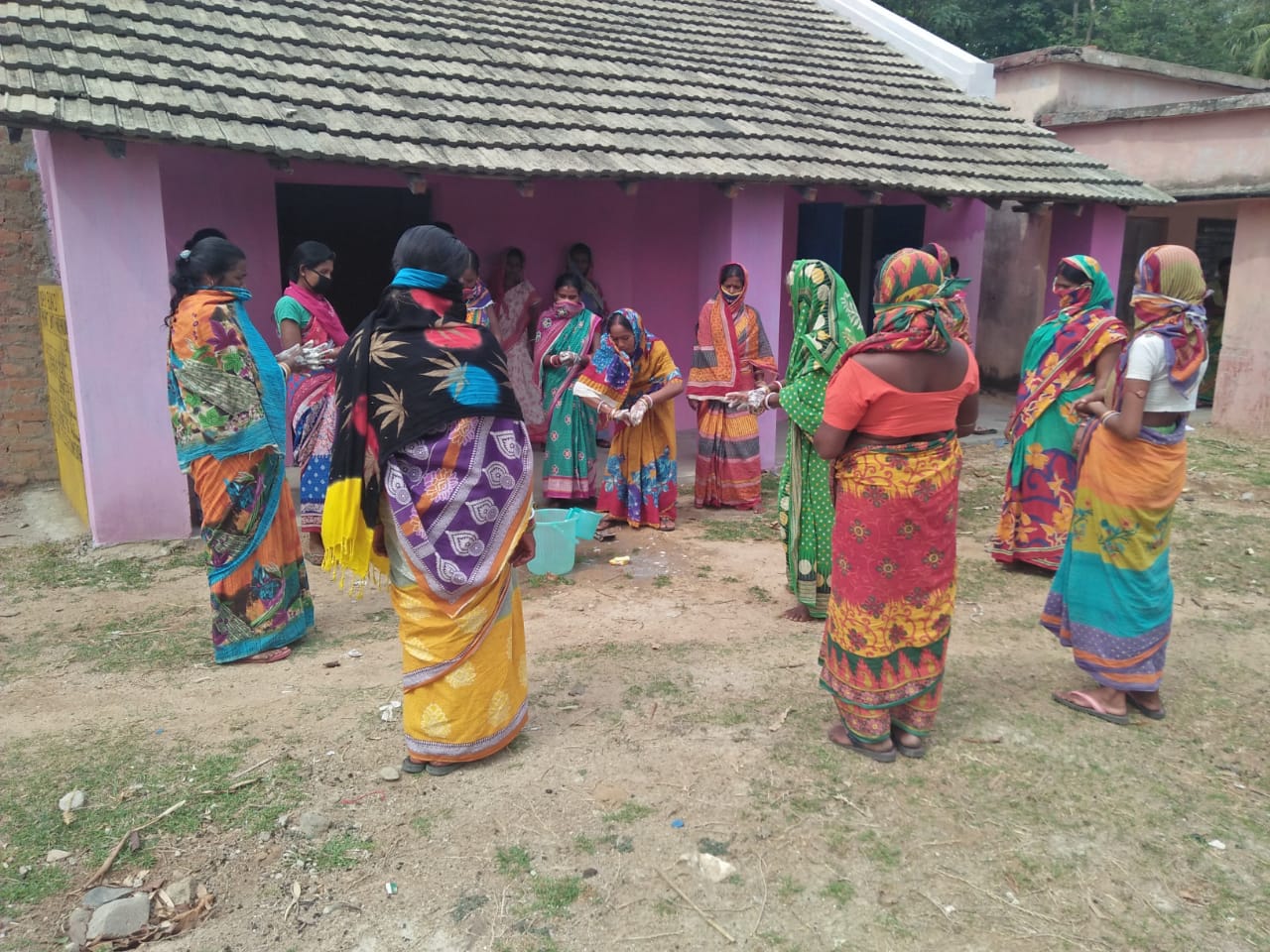Water supply during the pandemic time benefitted community multitudinously
StoryBy Parij Borgohain, Sangita Patra
1 July 2021
The household toilet and bathing room with running water at every home helped the community to stay safe from the COVID-19 infection.

Water availability during the time of Covid helped communities keep safe.
Photograph by Subin Das
When the COVID-19 countrywide lockdown was announced in March 2020, Jengapada village in Sundergarh district of Odisha was halfway towards receiving piped-water supply. The Village Water and Sanitation Committee (VWSC) of Jengapada came forward, assumed responsibility, and showed everyone how such a daunting task could be completed through proper planning and management even while following all COVID-19 safety protocols.
The 112 households in the village received piped-water supply in September 2020. A system of two borewell sources and an electricity-powered pumping station was constructed with support from Mahanadi Coalfields Limited. Each family in the village pays Rs. 50 per month to the VWSC for the electricity and to ensure future maintenance and sustainability of the project. The 11 women Self Help Groups in the village support the VWSC in the collection of the monthly tariff.
Lata Kishan is a VWSC member and the President of Binapani SHG in the village. She has been supporting Gram Vikas in motivating the community to construct and use toilet and bathing rooms. A mother of three, a daily wage labourer, Lata has been a driving force for more than three years in mobilising the community and arranging village-level meetings. “Earlier our water source used to get contaminated during the monsoons. We all had to go out on a long way just to have a bath. Now we do it in the comforts of our home. Our village looks clean and our children do not fall ill frequently now,” says Lata.
The committee also led the efforts to support eight vulnerable families in the construction of individual toilet and bathing rooms. These vulnerable families did not have physical capacity to contribute labour in the construction process. The VWSC motivated and mobilised the rest of the community in contributing labour to support these eight families.
Jasoda Kissan, a housewife in Jengapada village recounts, “I remember those scary days when we used to go out in the field to defecate, even in the dark, and encountered snakes, scorpions etc. Now we are so relaxed having access to a toilet even in the middle of the night. We now can take bath early in the morning and start cooking even before dawn breaks, because water is available at our doorstep. We had skin diseases bathing in the pond, but now all of us will agree that there are less incidences of skin infections.”
Ashrita Tigga from Tetrabahal village, says, “We now get clean drinking water at our homes. The water from cleaning utensils and bathing is used for watering the plants. I have grown chilly, tomato, brinjal, coriander leaves, onion and garlic in our backyard.” The VDC President of Tetrabahal explains “We have 52 families living in this village. We conduct monthly meetings where discussions around usage of grey water, regular payment of monthly fees, mechanisms to deal with a power failure etc. are carried out. From the monthly collections, we pay the electricity bill and the pump operator too, and any amount left is saved in the maintenance fund to deal with any emergencies in the future.”
Commissioning water supply during the pandemic has been invaluable for these communities. According to Sushama Pradhan, Sukulpali Village, the toilet and bathing room has helped the community to keep safe from Corona disease. In her own words “When markets, shops, transport and everything was shut down, our village committees sealed the village and did not allow anybody to go out of the village. We couldn’t even go out to our fields for work. At that time, we were lucky that we had sanitation facilities and access to water within our premises. We stayed safe at our homes and ate whatever was with us.”
Woman fetching water from the third tap at home.
Photograph by Ajaya Behera.
ACKNOWLEDGEMENT
Biswajit Sahu, Babrubahan Bhoi, Subin Das, and Sibaram Sahu provided the field level support to write the story. Ganesh Chakravarthi edited the story.
ABOUT THE AUTHOR
Parij Borgohain is the Junior Manager and Sangita Patra is the Thematic Manager for Documentation and Communications at Gram Vikas.
RELATED BLOGPOSTS
Water ushers in a new dawn in the life of Raidih’s farmers
Raidih’s farmers embrace sustainable agriculture and irrigation advancements, heralding a prosperous, water-efficient era in farming.
Gajendra Sahu’s kitchen dreams find wings in his village Adri
Gajendra Sahu transforms his culinary skills into a thriving village enterprise, inspiring Adri’s youth.
From one farmer’s soil to another: how Lochan’s journey in Odisha can inspire us all
Discover how pointed gourd farming reshaped the future for a small-scale farmer in Odisha.